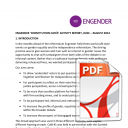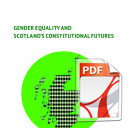Engender blog
Gender equality and Scottish Labour's plans for more devolution
Many of the women that have been part of our independence referendum discussions, Feminists talk Scotland's Futures, have wanted to hear more from the Better Together political parties about their vision for the future of Scotland.
Following a two-year deliberative process, Scottish Labour has now brought forward its proposals for additional devolution. Powers for a Purpose* describes the changes to the devolution settlement that a UK Government would deliver if Labour wins the 2015 Westminster elections.
In keeping with its pro-union stance, the proposals broadly suggest that much power and responsibility for issues that affect gender equality is retained by Westminster. These areas in which the UK Government and Parliament would continue to make decisions and law include the economy, employment and anti-discrimination, welfare or social security, pensions, immigration, broadcasting, and abortion.
Of the modest number of areas slated for additional devolution, there are three that relate particularly to women's equality.
Employment tribunals
Gender advocates were concerned by the recent introduction of fees that individuals require to pay to access employment tribunals across the UK. These amount to £1200 for discrimination cases, including those relating to equal pay and sexual harassment. Devolution of responsibility for fee-setting to Scotland does not mean that fees would not remain at this level, or increase, but it would bring the power of decision-making to Scotland.
Women on boards of public bodies and in public appointments
Scottish Labour proposes a transfer of powers, should they be required, to enable the Scottish Government to "ensure that women are fairly represented on Scotland's public boards and in public appointments". (Scottish Labour and the Scottish Government has disagreed on whether establishing quotas, or other temporary special measures, for public bodies' governance structures is currently within the competence of the Scottish Government.) The proposed transfer has the potential to increase women's representation within the decision-making structures of Scotland's public authorities, which Engender would enthusiastically welcome.
Enforcement of equalities legislation
Currently, equalities law is the provenance of Westminster. The UK Equality Act 2006 established a GB statutory equality body, the Equality and Human Rights Commission (EHRC), which is responsible for enforcement of this law across England, Wales, and Scotland**. Although the Equality Act 2010 enabled Scotland to place its own equality duty on public bodies, enforcement of this is carried out by a Commission that is solely accountable to the UK Parliament.
The EHRC is well-regarded in Scotland, but it is part of a cross-border institution that is constrained by the policy direction of the coalition UK Government. There are ways in which it could be very helpful to individual women, and to organisations working to comply with the law, to have an equality body that was able to be more responsive to the Scottish context. However, this may introduce a disconnect elsewhere in the equalities architecture, in that the enabling law for this body, as well as all other equalities law, will continue to be made by Westminster.
--
* Powers for a Purpose is currently only available in executive summary form. Engender will review the whole document when it is available.
** Northern Ireland has a separate set of equality laws, and a distinct equality body, the Equality Commission.
Share this post on …
Comments: 0 (Add)
Downloads
 'Constitution Cafes' Activity Report
An activity report on three 'constitution cafe' discussion events on gender equality and the independence referendum, held between June and August 2014.
'Constitution Cafes' Activity Report
An activity report on three 'constitution cafe' discussion events on gender equality and the independence referendum, held between June and August 2014.
 A Gender Edit of Scottish Labour's 'Red Paper'
This document is a ‘gender edit’ guide to the Scottish Labour party’s ‘red paper’ which sets out its case for a ‘no vote’ in the referendum.
A Gender Edit of Scottish Labour's 'Red Paper'
This document is a ‘gender edit’ guide to the Scottish Labour party’s ‘red paper’ which sets out its case for a ‘no vote’ in the referendum.
 Gender Equality and Scotland's Futures
This policy report is Engender's contribution to the Scottish independence debate.
Gender Equality and Scotland's Futures
This policy report is Engender's contribution to the Scottish independence debate.

Newsletter
Sign up to receive our newsletter here:
Sign up to our mailing list
Receive key feminist updates direct to your inbox: